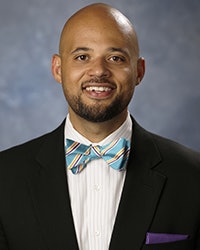The importance of collaborative partnerships across the institution, especially between chief diversity officers (CDOs) and chief financial officers (CFOs), was among the topics of conversation during a recent two-day, equity and inclusion retreat for diversity leaders in the Minnesota State Colleges and Universities system.
Across 37 institutions and 54 campuses, facilitating opportunities for leaders to collectively think about and work to meet the educational needs of more than 375,000 students is essential, system leaders said.
“Culturally responsive support, orientation, faculty development is a part of the conversation,” said Dr. Clyde Wilson Pickett, Jr., chief diversity officer of the system. “And making sure that we provide intentional ways for CDOs to have ongoing relationships with CFOs.”
 Clyde Wilson Pickett
Clyde Wilson PickettThese opportunities can be in the form of cabinet meetings, Pickett added, but also other spaces that encourage frequent partnerships or discussions including on committees, in broad institutional forums or in meetings on strategic and budgeting processes.
During the retreat, CDOs from institutions in the system heard from the Minnesota system chancellor Dr. Devinder Malhotra, several presidents of campuses, and the vice chancellor for finance, who spoke about how campus CDOs can make a pitch to resource their work.
“There has to be an intentional investment in equity and inclusion,” Pickett said, adding that CDOs and CFOs should be working together to examine how to intentionally and equitably fund support for ever-changing student populations and fund strategic outreach efforts to ensure that students continue to be attracted to their campuses.
Such collaboration helps to reveal the interconnectedness of the work of both CFOs and CDOs, Pickett said, and how diversity and inclusion goals in the form of retaining students and faculty ties into CFO goals of managing revenue streams for the institution.
Pearl Alexander, executive director of staff diversity, inclusion and engagement at Georgia Institute of Technology, said that CDOs can move towards accomplishing their objectives by beginning to show the value of their work “almost instantly.”
 Pearl Alexander
Pearl Alexander“We always are asked to demonstrate our impact,” Alexander said. “Sometimes, our impact isn’t as obvious as some things — you know, two plus two is four. But with our impact, sometimes it takes time for the concepts to settle in and to sink in with people.”
To further the impact of its diversity and inclusion work, Alexander’s office works closely with the university’s communications and marketing team so that “we literally are communicating as we are building and manifesting,” she said.
Georgia Tech’s financial investments for diversity and inclusion are stratified across the institution, Alexander added, because diversity leaders collaborate with other institutional partners in Human Resources, an organizational development team and more.
“We are deeply ingrained in this idea of creating thought partners and being thought partners,” she said. “When you invest in others, they’re willing to invest in you.”
CDOs can leverage their relationships with people across departments and move their work forward by being willing to learn about and find collaborative solutions to the “pain points” of other institutional leaders, building competencies to become cross-functional and tapping into existing pockets of expertise on campus for support.
“A lot of times faculty have expertise that you wouldn’t know they have until you start asking,” Alexander said, pointing out how CDOs can learn from business school faculty on business problems or challenges, for example.
Emphasizing the need for investment in diversity and inclusion to flow “organically,” Pickett said that “it has to be a multi-faceted approach to advancing the work forward.”
Significantly, Alexander suggested that CDOs should be generally curious in their line of work and approach their work as an “agent of harmony” in the organization.
“I don’t know what I don’t know,” she said. “It takes really being exploratory within the organization to uncover talent, and then to also connect — if you still have gaps — with people who are willing to work with you just because they like what you stand for and the work that you’re doing and creating in the world.”
Tiffany Pennamon can be reached at [email protected]. You can follow her on Twitter @tiffanypennamon.


















